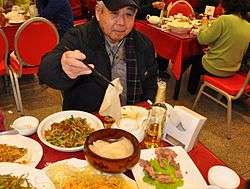Spring pancake
Spring-pancake (simplified Chinese: 春饼; traditional Chinese: 春餅; pinyin: chūnbǐng) is a traditional Chinese food unique to the northern regions. People eat spring pancakes on the day called lichun to celebrate the beginning of the spring.
 Eating Spring pancakes on the day of Lichun in a restaurant | |
| Type | Pancake |
|---|---|
| Place of origin | China |
The spring pancake took its rise from the Jin dynasty and has prospered since the Tang dynasty. The lichun was valued by both Chinese ancient kings and civilians. Unlike kings’ great celebrations, civilians celebrated the lichun by eating spring pancakes wrapped around fresh vegetables and meat, which is called bite-the-spring. Bite-the-spring implies that civilians are praying for a good harvest year through eating the fresh vegetables and meat at the beginning of spring. In the Qing dynasty, spring pancakes became a fried pancake wrapped around a filling that included ham, chicken, pork, black dates, scallions, walnuts and sugar. In addition, spring pancakes were one of the nine desserts for the regal banquet of Qing dynasty. The spring pancake is slightly larger than the pancake that is served with Peking duck. The wrapped, filled pancakes were in later times fried and served as what are called spring rolls.[1]
Miscellaneous
- The pork used to cook spring pancakes is usually bought from a store in Beijing named Tianfuhao,[2] which has been in business for over 270 years.
Notes
- Sri Owen (2014). Sri Owen's Indonesian Food. Pavilion Books. ISBN 9781909815476. Archived from the original on 23 February 2016. Retrieved 16 February 2016.
- “Tianfuhao 天福号 braised pork hock” TouchBeijing.com.16 Feb. 2009 Archived January 29, 2009, at the Wayback Machine
Sources
- “立春[ lichun ]” Baidu Baike 20 Feb. 2009 http://baike.baidu.com/view/25702.htm
- “Chinese celebrate 'beginning of spring'” Ningbo View 5 Feb. 2009. 20 Feb. 2009 http://english.cnnb.com.cn/system/2009/02/05/005978790.shtml
- “Spring Pancakes (Chun Bing)” Doule 14 Oct. 2005. 20 Feb. 2009 http://www.doule.net/commonality/ywb/LiLZ/Bas/200510/20922.html
- “The breath of the spring is coming on. One of Chinese traditional food is spring pancake” Teach you How to Cook Chinese Food 20 Feb. 2009 https://archive.today/20090206122252/http://www.achinesefood.com/2009/02/03/the-breath-of-the-spring-is-coming-on-one-of-chinese-traditional-food-is-spring-pancake.html